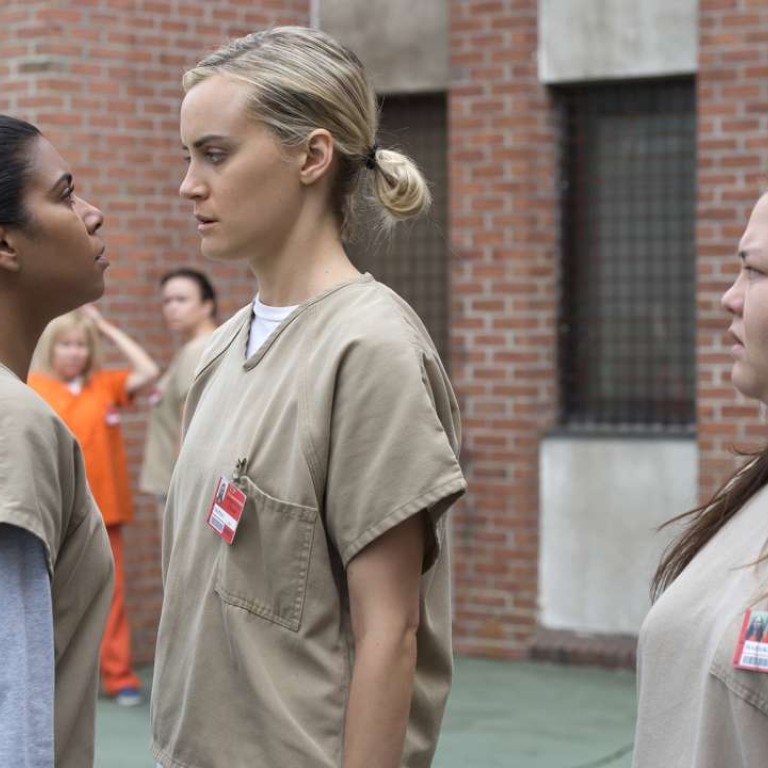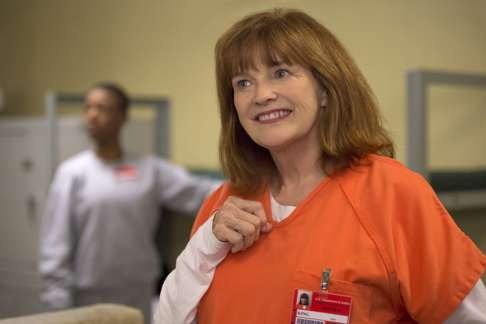
Orange is the New Black returns, darker and more relevant than ever
Fourth season of Netflix prison drama is more tuned in than ever to the world beyond the jail, as the series tackles societal issues – especially race and civil liberties – from the inside out
There’s only one television at Litchfield, the fictional prison at the centre of Orange is the New Black, and the inmates are usually arguing over it. While some want to watch entertainment, news does occasionally seep in.
Season four is more tuned in than ever to the world beyond the prison, as the show tackles societal issues – especially race and civil liberties – from the inside out.
In the first of this season’s 13 episodes released in its entirety last week, Litchfield gets an influx of new inmates – one of many consequences of the formerly US federal institution being sold to the private outfit Management & Correction Corporation (MCC).
Aleida Diaz (Elizabeth Rodriguez), one of the prison’s more blunt inmates, puts it this way: “It’s sardine time, bitches. We a for-profit prison now. We ain’t people no more. We bulk items.”
There are plenty of laughs and insightful one-liners to go around, but season four is also really heavy. Have tissues on hand, and maybe some hooch while you’re at it. (I’m being intentionally vague here, as Netflix has promised that anyone who divulges certain plot points will get disciplinary slips – shots, as the inmates call them.)

When Orange is the New Black premiered in 2013, the series marked Netflix as a major player in the original-programming game. I can already hear the protests from the (dwindling) House of Cards crowd. But by the end of its first year, Orange is the New Black became the network’s most-watched original show ever, at least according to Netflix, which doesn’t disclose ratings.
Less quantifiable is the show’s generous dose of heart, which it owes to its talented ensemble cast and a skilful mix of comedy and drama emerging from the writers’ room, led by show creator Jenji Kohan.
Orange is the New Black, based on Piper Kerman’s 2010 memoir, has taken quite a bit of creative licence in adapting its source material.
Piper Chapman (Taylor Schilling), the character Kerman inspired, isn’t even the star of the show. It would be hard to single out just one amid so many fan-favourite characters (Taystee, Morello, Poussey, Maritza, Big Boo and Red – to name a few). Piper ranks as the least interesting inmate at Litchfield and, to the show’s credit, it figured this out early on.
But the essence of Kerman’s story – a white, educated middle-class woman doing a minimum-security prison bid alongside women with life experiences vastly different from her own – has remained a consistent theme, and a particularly salient one this season.

One of the most consistently realistic aspects of life at Litchfield has been the self-segregation of white, black and Latina inmates. It’s so rigid, in fact, that there have been running jokes about where “others,” such as half-Japanese inmate Brook Soso (Kimiko Glenn), fit in. Overcrowding in the new series heightens the racial tension.
The tragicomedy of Orange is the New Black demands a delicate balance, and season four doesn’t always get it right, though most of the jokes are funny.
Black Cindy, er, Tova (Adrienne Moore), who memorably converted to Judaism last season, uses the few office supplies available to her to fashion a mezuzah for her bunk, which she shares with a Muslim newcomer.

The most annoying antics surround the arrival of Litchfield’s highly anticipated new inmate: professional chef and TV host Judy King (Blair Brown). The show goes to great lengths to paint Judy as a sassy Southern belle with Paula Deen tendencies, and I do declare it overwrought (sips sweet tea).
But Judy’s pampered stay at Litchfield also highlights the system’s class and racial inequalities.
Orange is the New Black became a source of debate last year before the Emmys, when the TV Academy ruled that the show could no longer compete as a comedy. Netflix appealed against the decision and lost, leaving it firmly in the drama category.
Season four feels more like a drama than ever, and that’s not a bad thing. The series has introduced a multitude of characters we don’t usually see on television and given them complicated and intimate relationships that speak volumes about issues not contained to prison’s impenetrable walls.
For a show that has always played on themes of privilege and power, this season’s dark trajectory is as inevitable as it is haunting.
Orange is the New Black (13 episodes) is streaming on Netflix

